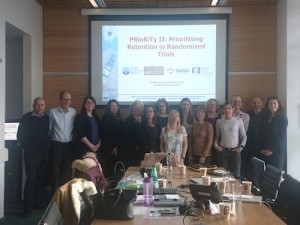Priority 2: Prioritising Retention in Randomised Trials
What is PRIORITY II about?
If you’d like to watch a 2 and a half minute video outlining PRIORITY II, click on the play button in the video below.
The project started with a survey, which involved people across the UK and Ireland who are, or have been, involved directly, in designing, running, analysing, or taking part and/or staying involved in randomised trials (see below for an explanation of what trials are). Most trials collect data from participants as part of their continued involvement in the trial and will help to answer whether one treatment is better than another. This is known as “follow-up”. Some trials collect data long after the treatments being tested have been given.
Retention refers to the number of people staying involved or “followed up” in trials and whether they complete or provide all the measurements the trial team needs. For example, the trial may ask participants to return for a study visit or return a questionnaire. This is important because if people join a trial but cannot be followed up, the trial results may be inaccurate and misleading which wastes vital research time and money.
Our first survey collected people’s suggestions for important questions about trial retention that still need answering. Those questions have been reduced to a shortlist of 27 questions. Our second survey asks people to choose their top 10 questions from this shortlist. These top 10 lists will feed into the next stage of the process, which will produce the final list of the 10 most important unanswered questions in trial retention.
We want your help in improving the future of clinical trials by improving what we know about the best ways to encourage people to stay involved in clinical trials.
What do we mean by “trials”?
Please find an explanation of research terms here.
Who took part in the survey?
 We were looking for people from the following groups to help us find the 10 most important questions:
We were looking for people from the following groups to help us find the 10 most important questions:
- People who have been invited to take part or have taken part in a randomised trial
- Parents or carers of people who have taken part or been invited to take part in a randomised trial
- People who have participated in aspects of trials as partners in the research (e.g. helped to secure the funding, members of trial committees, commented on patient information such as leaflets or letters etc).
- Health professionals and research staff whose work includes encouraging people to stay involved in randomised trials once they have agreed to take part.
- People who have designed, run, analysed, reported on or regulated (e.g. ethics committees) randomised trials
- Anyone with experience of the methods of randomised trials (i.e. how trials are done).
Who took part in the survey?

If you would prefer to give us your answers on paper, please contact k.gillies@abdn.ac.uk and we will send you a paper copy of the survey.
How else can you get involved?
- Follow us on Twitter @Trial_Forge, @hrbtmrn and @LindAlliance and tweet using hashtag #trialretention. Download the PRioRiTy 2 Tweet Sheet for ideas
- Mention the work in your next newsletter or blog. We can supply written information about the project for emails, newsletters or websites – please mention us wherever you can.
What will happen to your feedback?
 Once we have collected enough answers to this survey, we will bring approximately 30 people together for a face to face workshop. At the workshop we will discuss the questions about retention to trials that people believe are important, and come to an agreement on what the final Top 10 priority questions for future research are.
Once we have collected enough answers to this survey, we will bring approximately 30 people together for a face to face workshop. At the workshop we will discuss the questions about retention to trials that people believe are important, and come to an agreement on what the final Top 10 priority questions for future research are.Attendees at the face to face workshop will come from a range of locations and have experience of different health areas.
We hope that this final Top 10 list of priorities will improve the process of how people can be helped to stay involved in trials. Results of this survey will be made publicly available in early 2019.
Who is running this project?
 A Steering Group that represents the public, researchers, health professionals and trial experts runs this project (many of whom are in the photograph on the right). The project, supported by the University of Aberdeen, the Chief Scientist Office of Scotland, the Health Research Board (HRB, Ireland) and working with the James Lind Alliance (JLA, England) is based on a process developed by the James Lind Alliance, which brings patients, carers and healthcare professionals together in Priority Setting Partnerships. These partnerships identify and prioritise unanswered questions about healthcare that the public , carers and professionals jointly agree are the most important. The aim of this is to help ensure that those who fund health research are aware of what future research will really matter in everyday use.
A Steering Group that represents the public, researchers, health professionals and trial experts runs this project (many of whom are in the photograph on the right). The project, supported by the University of Aberdeen, the Chief Scientist Office of Scotland, the Health Research Board (HRB, Ireland) and working with the James Lind Alliance (JLA, England) is based on a process developed by the James Lind Alliance, which brings patients, carers and healthcare professionals together in Priority Setting Partnerships. These partnerships identify and prioritise unanswered questions about healthcare that the public , carers and professionals jointly agree are the most important. The aim of this is to help ensure that those who fund health research are aware of what future research will really matter in everyday use. Steering Group Members
Linda Biesty, School of Nursing and Midwifery, National University of Ireland Galway
Peter Brocklehurst - Professor of Women's Health and Director of the Birmingham Clinical Trials Unit

Valerie Brueton, King's College London
Declan Devane - Director of the Health Research Board-Trials Methodology Research Network

Jim Elliott, Public and Patient Involvement Lead, Health Research Authority
Sandra Galvin - Coordinator for the HRB-TMRN

Carrol Gamble, Professor of Medical Statistics at the University of Liverpool

Katie Gillies - Research Fellow, Health Services Research Unit, University of Aberdeen
From May 2017 Katie took on the role of Programme Director for the Health Care Assessment programme.
Patricia Healy – Postdoctoral Researcher, School of Nursing and Midwifery, NUI Galway

Kerry Hood, Cardiff University

Joan Jordan - Public Representative
Doris Lanz, Trial Manager, Queen Mary University London
Beccy Maeso - Senior Research Manager, National Institute for Health Research Evaluation Trials and Studies Coordinating Centre (NETSCC)

Amanda Roberts, Public and Patient Involvement Partner
Imogen Skene, Senior Research Nurse, Barts Health NHS Trust
Irene Soulsby, Public and Patient Involvement Partner
Derek Stewart - Associate Director for patient and public involvement for the National Institute for Health Research Clinical Research Networks Coordinating Centre

David Torgerson, Head of the University of York Trials Unit, University of York
Shaun Treweek - Health Services Research Unit University of Aberdeen
Caroline Whiting - Research Manager, National Institute for Health Research Evaluation Trials and Studies Coordinating Centre (NETSCC)

Andrew Worrall, Public and Patient Involvement Partner
Sharon Wren, Health Services Research Unit, University of Aberdeen
Want to keep in touch?
Follow us on Twitter @Trial_Forge, @hrbtmrn and @LindAlliance



